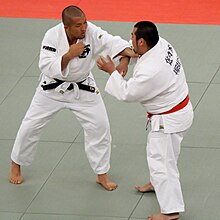Keiji Suzuki
Keiji Suzuki ( Japanese 鈴木 桂 治 , Suzuki, Keiji ; born June 3, 1980 in Jōsō , Ibaraki Prefecture ) is a former Japanese judoka . He was Olympic champion in 2004 and world champion in 2003 and 2005.
Career
The 1.85 m tall Keiji Suzuki won the 1998 Junior World Championships in Cali, the light heavyweight title, the class up to 100 kilograms. In 1999 he won his first World Cup victory in Leonding. In December 2000 he received the bronze medal at the Student World Championships in Málaga, and in October 2001 he won the Universiade in Beijing . A year later he won the gold medal at the Asian Games in Busan. In April 2003, Suzuki won the Japanese Open Light Heavyweight Championships. At the end of the month he reached the final of the open Japanese championships in the open class, but lost there against Kōsei Inoue . At the World Judo Championships held in Osaka in September 2003 , Inoue won the light heavyweight division, Suzuki won the world championship in the open class. At the Japanese Open Championships in 2004, Suzuki only finished third in the light heavyweight division, but won the Open Class title three weeks later. In May 2004 Suzuki competed at the Asian Championships in Almaty in the heavyweight division, the class over 100 kilograms. There he won the silver medal behind the South Korean Kim Sung-bum . At the 2004 Olympic Games in Athens, Suzuki also competed in the heavyweight division. In the first fight against the German Andreas Tölzer , he had to walk the full distance of five minutes and won with an average score. In the rounds after that he met the Greek Kharis Papaioannou , the Belarusian Juri Rybak , the Italian Paolo Bianchessi and in the final against the Russian Tamerlan Tmenow , all of whom he defeated prematurely by Ippon .
After Suzuki had won the open Japanese championships in the open class in April 2005, he entered the light heavyweight division of the Judo World Championships in Cairo in 2005 and won the title by beating the Ukrainian Vitaliy Bubon in the final . In 2006 Suzuki finished second at the Japanese Open Championships in the open class, in 2007 he won the light heavyweight and open class. In 2008 he won again in the light heavyweight division and took second place in the open class. At the Olympic Games in Beijing in 2008 Suzuki competed in the light heavyweight division, in his first fight he lost prematurely to the later Olympic champion Naidangiin Tüwschinbajar from Mongolia. In the hope round he was eliminated after 34 seconds against the German Benny Behrla .
In 2009 Suzuki started again in the heavyweight division, at the Asian Championships in Taipei he lost in the final against the South Korean Kim Soo-whan . In 2010 Suzuki won the Japanese Open Heavyweight Championships. At the Judo World Championships in Tokyo in 2010 he received a bronze medal in the open class. In 2011 he won his last title at the Japanese Open Championships in the Open Class. At the Judo World Championships 2011 , which were held in Paris at the end of August, the open classes for men and women were no longer part of the competition program for the first time. At the end of October, title fights in the open class took place in Tyumen, in which Suzuki won the bronze medal. In 2012 he ended his international career.
Web links
- Keiji Suzuki in the Sports-Reference database (English; archived from the original )
- Keiji Suzuki on Judoinside (English)
Footnotes
- ↑ Japanese Open Championships 2003
- ↑ Asian Championships 2004
- ↑ Asian Championships 2009
- ↑ World Championships 2011 in the open classes
| personal data | |
|---|---|
| SURNAME | Suzuki, Keiji |
| ALTERNATIVE NAMES | 鈴木 桂 治 (Japanese) |
| BRIEF DESCRIPTION | Japanese judoka |
| DATE OF BIRTH | 3rd June 1980 |
| PLACE OF BIRTH | Jōsō , Ibaraki Prefecture |
